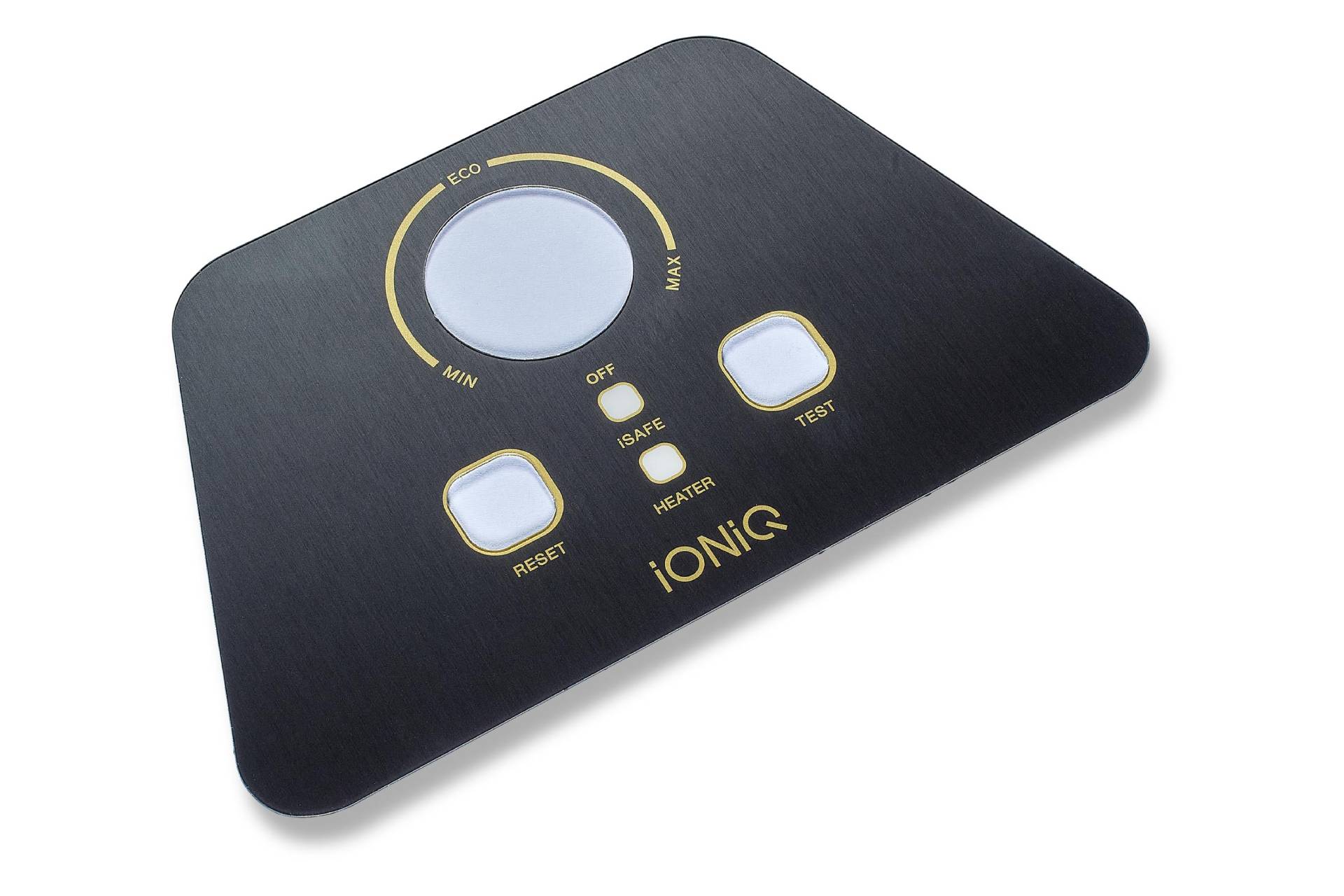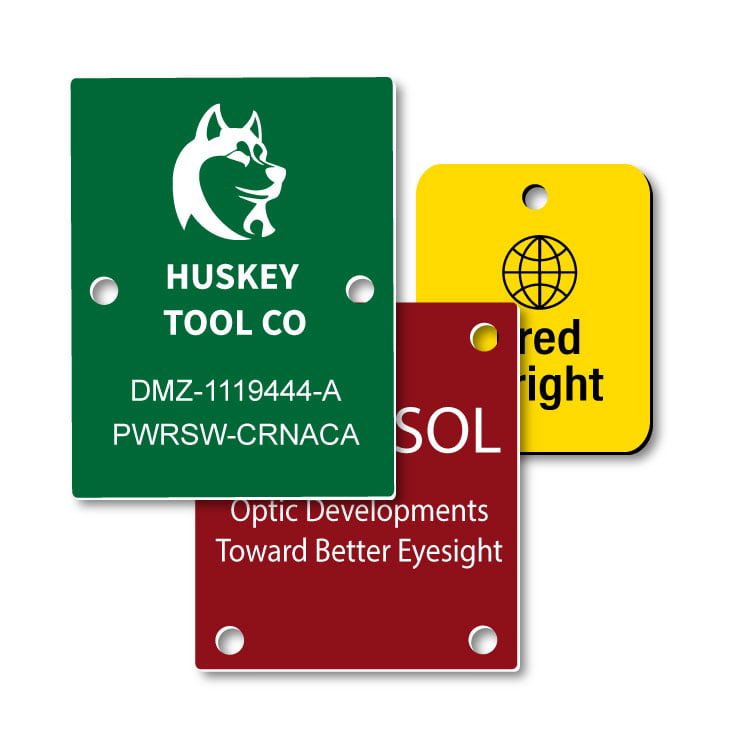Plastic Nameplates in Construction: Labeling Gear and Reducing Risk
Plastic Nameplates in Construction: Labeling Gear and Reducing Risk
Blog Article
Just How Plastic Nameplates Are Made: A Comprehensive Overview to Their Production Refine
The production of plastic nameplates involves a number of accurate actions, beginning with the option of suitable materials to the final complements. Each stage is critical, guaranteeing the product satisfies certain demands for longevity and aesthetics. Various production strategies play a significant role in crafting these nameplates. Recognizing these processes can clarify the complexities behind what could appear like a straightforward product. What variables add to the quality and personalization of these nameplates?
Recognizing Plastic Materials Made Use Of for Nameplates

The Design Refine: From Idea to Prototype
The design process for plastic nameplates starts with a clear concept that overviews the total development. Designers work together with customers to specify the objective, style, and particular requirements of the nameplate. This first stage consists of brainstorming sessions, mapping out ideas, and selecting colors and fonts that align with branding goals.Once the principle is developed, developers utilize computer-aided style (CAD) software to create comprehensive digital depictions. These models permit for visualization and adjustments prior to moving on. Feedback from stakeholders is indispensable during this phase, as it assists improve the design to satisfy expectations.After wrapping up the electronic prototype, a physical model might be created, commonly with methods like 3D printing. This substantial depiction allows further assessment of aesthetic appeals and performance. Overall, the layout process is a crucial step that lays the foundation for the effective manufacturing of high-grade plastic nameplates.
Cutting and Forming the Plastic
In the cutting and shaping phase of plastic nameplate production, the selection of products plays a necessary function in establishing the last product's top quality and toughness (Plastic Nameplates). Various precision reducing strategies, such as laser cutting and CNC machining, guarantee that the plastic is formed with accuracy and uniformity. This mix of careful material selection and progressed cutting techniques is essential for creating high-grade nameplates

Product Choice Process
Picking the best product is vital for generating top quality plastic nameplates. Different sorts of plastics are offered, each offering unique advantages and characteristics. Common selections consist of acrylic, polycarbonate, and PVC. Acrylic is preferred for its clarity and UV resistance, making it perfect for outside applications. Polycarbonate, understood for its toughness and influence resistance, is appropriate for atmospheres that require boosted protection. PVC is often picked for its cost-effectiveness and adaptability in style. The option process additionally considers aspects such as surface, thickness, and color surface, which can considerably influence the last appearance and functionality of the nameplate. Ultimately, the selected product must align with the planned usage and aesthetic objectives of the plastic nameplate.
Precision Trimming Techniques
While selecting the ideal product lays the foundation, accuracy cutting techniques play a necessary duty in shaping the plastic nameplates into their last kinds. Various approaches, including laser cutting, CNC milling, and die reducing, are utilized to achieve precision and consistency. Laser reducing makes use of focused light to generate intricate styles and clean edges, perfect for intricate patterns. CNC milling uses convenience by removing excess material with precision, accommodating different densities and shapes. Die cutting, on the various other hand, enables for automation of uniform items, enhancing effectiveness. Each strategy is selected based upon the style specifications and the desired surface, making sure that the last item meets top quality standards and customer assumptions while preserving sturdiness and visual charm.
Printing Methods for Modification
How can producers attain accurate and lively layouts on plastic nameplates? The response hinges on numerous printing methods customized for personalization. Digital printing has actually obtained popularity as a result of its ability to create high-resolution photos and intricate styles straight onto plastic surface areas. This technique enables fast turnaround times and minimal arrangement costs, making it perfect for brief runs and customized orders.Screen printing remains an additional commonly made use of technique, especially for larger amounts. It involves producing a stencil and using layers of ink, causing rich colors and resilience. UV printing, which uses ultraviolet light to treat the ink, is also reliable, giving excellent attachment and resistance to fading.Additionally, pad printing uses convenience for irregularly designed nameplates, permitting in-depth designs on difficult surface areas. These printing techniques enable makers to satisfy varied customer needs while making certain high quality and durability in their plastic nameplate items.
Surface Treatments and Finishing Options

Quality Control Procedures in Manufacturing
Guaranteeing the highest requirements of quality control throughout the production of plastic nameplates is necessary for preserving item honesty and consumer contentment. Manufacturers apply extensive assessment procedures at different stages of the manufacturing process. At first, basic materials undertake comprehensive testing to validate they satisfy specifications for toughness and shade consistency. During the molding phase, automated systems monitor criteria such as temperature and pressure to avoid defects.In enhancement, aesthetic inspections are carried out to recognize any kind of surface blemishes or misalignments. When the nameplates are produced, they undergo useful tests, including bond examinations for published elements and stress examinations for sturdiness. Quality control groups typically use statistical tasting techniques to evaluate batches, ensuring that any variances from requirements are without delay attended to. This in-depth method not just boosts item quality however also fosters depend on with customers, verifying the producer's dedication to excellence in every nameplate created.
Packaging and Distribution of Finished Nameplates
The product packaging and circulation of ended up plastic nameplates are crucial steps in ensuring they get to customers in optimal problem. Various product packaging materials are selected to shield the nameplates throughout transportation, while shipping methods are very carefully picked based upon performance and cost-effectiveness. Furthermore, efficient storage space remedies are applied to maintain quality up until the nameplates are provided.
Packaging Products Made Use Of
When distributing completed plastic nameplates, selecting ideal product packaging materials is vital to ensure their protection throughout transit. Frequently used materials include bubble wrap, foam cushioning, and cardboard boxes, all designed to cushion the nameplates versus impacts and shocks. Bubble wrap gives a versatile obstacle, while foam cushioning guarantees that nameplates remain securely in position, lessening the risk of scrapes or breakage. In addition, durable cardboard boxes are utilized to include the nameplates, supplying architectural support and security from outside components. Tags may be put on suggest handling guidelines or vulnerable contents, additionally boosting safety throughout transport. Generally, making use of top notch packaging products considerably contributes to the integrity and discussion of the finished plastic nameplates upon arrival at their location.
Shipping Techniques Used
Reliable distribution of completed plastic nameplates relies upon various shipping techniques that assure safe and secure and timely distribution. Companies usually use courier services, products delivery, and postal solutions, depending upon the dimension, weight, and destination of the bundles. For regional deliveries, courier solutions supply rapid transportation, making sure nameplates reach clients quickly. For bigger orders, freight delivery is chosen, using trucks or delivery containers to transfer bulk amounts successfully. Postal solutions act as an affordable option for smaller sized shipments, particularly for residential distributions. All delivery techniques prioritize safety packaging to avoid damages throughout transit. Tracking systems are also made use of to monitor shipments, giving customers with real-time updates and peace of mind relating to the condition of their orders.
Storage Solutions Implemented

Regularly Asked Questions
What Types of Services Commonly Make Use Of Plastic Nameplates?
Plastic nameplates are commonly utilized by various companies, including workplaces, manufacturing facilities, institutions, and medical facilities. These nameplates offer vital features such as recognition, info screen, and branding, adding to organizational performance and expert appearance throughout varied atmospheres.
How much time Does the Entire Manufacturing Process Take?
The production process duration differs based upon complexity and amount, normally ranging from a few days to several weeks. Factors influencing this timeline consist of style authorization, material schedule, and production methods used by the company.
Can Plastic Nameplates Be Recycled After Use?
Plastic nameplates can be recycled, offered they are made from recyclable materials. The accessibility of reusing programs and local guidelines may influence their recyclability. Correct disposal methods are important to guarantee effective recycling.
What Are the Ecological Influences of Plastic Nameplate Manufacturing?
The ecological influences of plastic nameplate production consist of carbon exhausts, source deficiency, and air pollution from manufacturing processes. Plastic Nameplates. Furthermore, inappropriate disposal adds to plastic waste, adversely affecting ecosystems and wildlife, highlighting the requirement for lasting techniques
Are There Any Kind Of Security Concerns With Plastic Nameplates?
Safety and security problems relating to plastic nameplates mainly entail prospective chemical direct exposure throughout production and the risk of products weakening in time, which might result in unsafe compounds being released, affecting both human health and the atmosphere. While various products can be made use of for nameplates, plastic remains a prominent choice due to its versatility and toughness. In the cutting and forming stage of plastic nameplate production, the option of products plays an essential function in establishing the final item's top quality and toughness. Selecting the best product is essential for creating top quality plastic nameplates. While choosing the suitable product lays the groundwork, precision cutting strategies play a necessary duty in forming the plastic nameplates right into their final types. When distributing ended up plastic nameplates, choosing ideal product packaging products is important to ensure their security throughout read transportation.
Report this page